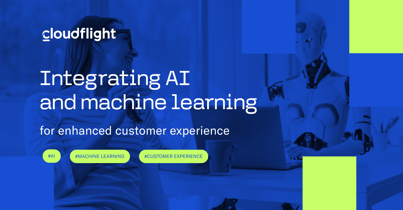From managing inventory and optimizing product listings to analyzing customer behavior and providing top-notch customer support, eCommerce brands are always juggling multiple tasks and processes to consistently deliver value. This is where AI-powered tools come into play.
AI can automate repetitive and labor-intensive tasks to enable teams to focus on strategy and growth. By leveraging AI, eCommerce platforms can tailor their operations to meet specific goals, including boosting sales, enhancing customer experience, and streamlining back-end processes.
In this article, let's explore five AI-powered tools your eCommerce business needs in 2024 to help you be smarter, more efficient, and ready to face the challenges of the digital marketplace.
1. Alt Text AI
Images are not just decorative elements but pivotal tools for increasing online visibility. Alt text, short for "alternative text," plays a crucial role in making these images discoverable by search engines. This will help boost the SEO performance of an eCommerce store.
However, for platforms with thousands of product images, ensuring each one has accurate and descriptive alt text is a daunting task. This is where Alt Text AI comes in as a game-changer for eCommerce stores, particularly those hosted on WordPress. With its AI-driven capabilities, the tool can analyze images and produce relevant, keyword-rich alt text to enhance your store's search engine visibility and accessibility.
Some key features of Alt Text AI include:
- Automated alt text generation: utilizes AI to create descriptive alt text for images.
- Bulk processing: capable of handling numerous images simultaneously, saving time and effort.
- SEO optimization: improves image SEO by ensuring every image has appropriate alt text.
- User-friendly interface: easy to integrate and use within the WordPress ecosystem.
It is essential to note that other eCommerce-grade CMS solutions, such as Sitecore and Drupal, also offer AI-powered plugins. However, WordPress excels both in terms of the volume of options presented and the extensive community support for developers which allows users to build their own plugins easily.
As a result, eCommerce brands with specific AI needs might be motivated to migrate from Drupal to WordPress, even though the former is an open-source legacy CMS.
2. Algolia
Consumers often search based on their needs rather than specific products. This search behavior poses a unique challenge, especially for lesser-known or emerging eCommerce brands. These brands must ensure that their products are not just listed online but are also easily discoverable based on various search intents.
Algolia, an AI-powered search engine, addresses this challenge by enhancing the search experience on eCommerce platforms. It connects the dots between user intent and relevant products to make it easier for consumers to find what they need through a sophisticated algorithm that understands and predicts search queries to offer accurate and personalized results.
Key features of Algolia include:
- Instant search: provides real-time search results to enhance user experience.
- AI-optimized ranking: utilizes AI to rank products based on user behavior and preferences.
- Voice search capabilities: allows users to search using voice commands to broaden accessibility.
- Customizable relevance settings: offers the ability to tweak search parameters for more tailored results.
Additionally, Algolia's versatility makes it a suitable choice for both B2B and B2C eCommerce platforms. By integrating Algolia, eCommerce businesses can significantly improve their search functionality, leading to higher engagement, better customer satisfaction, and potentially increased sales.
3. Mindrest
Pricing and affordability still remain pivotal factors for online shoppers. Because of this, it's essential for businesses to not only set the right prices but also to continuously adjust them in response to market dynamics. However, this can be an incredibly resource-intensive process.
Mindrest simplifies the daunting task of price management by offering intelligent, data-driven insights. By automating the process of price monitoring and optimization, it empowers eCommerce businesses to stay competitive without constant manual effort.
The key features of Mindrest include:
- Competitive price monitoring: tracks competitors’ pricing in real time to provide valuable market insights.
- Dynamic pricing strategies: automatically adjusts prices based on market conditions and business rules.
- Price optimization analytics: offers in-depth analytics to understand the impact of pricing strategies.
- Integration with major eCommerce platforms: seamlessly integrates with various eCommerce platforms for streamlined operations.
It not only saves time and resources but also ensures that your pricing strategy is always aligned with market trends to enhance profitability and competitiveness.
4. Chatfuel
As customer expectations soar, they seek not only quick responses but also personalized interactions that cater to their specific needs and preferences. However, for small and medium-sized eCommerce teams, providing such tailored support around the clock can be a formidable challenge.
Chatfuel is a chatbot platform designed to automate customer interactions and make them more efficient and personalized. The tool enables eCommerce businesses to offer prompt customer support without the need for large customer service teams to ensure customers receive immediate attention at any time.
Some key features of Chatfuel include:
- Automated chat responses: provides instant replies to common customer queries to enhance response times.
- Personalization capabilities: tailors interactions based on customer data for a more personalized experience.
- Integration with social media platforms: seamlessly connects with platforms like Facebook for wider reach.
- Customizable chat flows: offers flexibility in designing conversation flows to suit specific business needs.
Chatfuel not only streamlines customer service operations but also enhances customer satisfaction through timely and relevant interactions.
5. Vue.ai
Precision in eCommerce is paramount, extending across various stages such as inventory management, product categorization, and tagging. Each element needs to be meticulously managed to ensure a seamless shopping experience. However, achieving this level of precision, especially with limited personnel and the need to juggle multiple software solutions, presents a significant challenge for many eCommerce businesses.
Vue.ai streamlines various aspects of online retail through intelligent automation and data-driven insights. It helps to reduce the operational load while increasing efficiency and accuracy across different eCommerce processes.
Some of the key features include:
- Automated product tagging: utilizes AI to accurately tag products to improve searchability and discovery.
- Smart inventory management: offers AI-powered tools for efficient inventory tracking and optimization.
- Personalized customer experiences: creates tailored shopping experiences based on individual customer data.
- Visual search capabilities: allows customers to search products using images to improve user engagement.
By leveraging the power of AI, Vue.ai enables eCommerce platforms to maintain precision and quality in their services while simultaneously optimizing their internal processes for better scalability and growth.
Takeaways
In this exploration of AI-powered tools for eCommerce businesses, we've delved into various solutions that address not only common challenges but also propel online stores toward efficiency and innovation. From enhancing online visibility through Alt Text AI's automated image descriptions to streamlining search experiences with Algolia, these tools are revolutionizing how eCommerce operates.
The integration of these AI tools marks a significant shift in eCommerce strategies. They focus on automation, personalization, and data-driven decision-making to ultimately lead to increased efficiency, customer satisfaction, and business growth.
Published January 4, 2024













